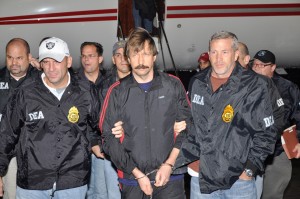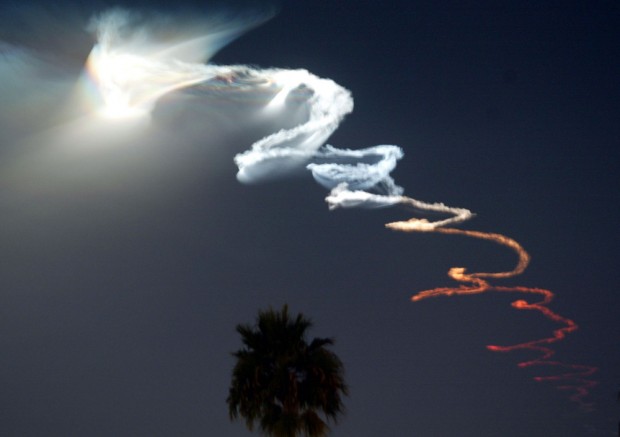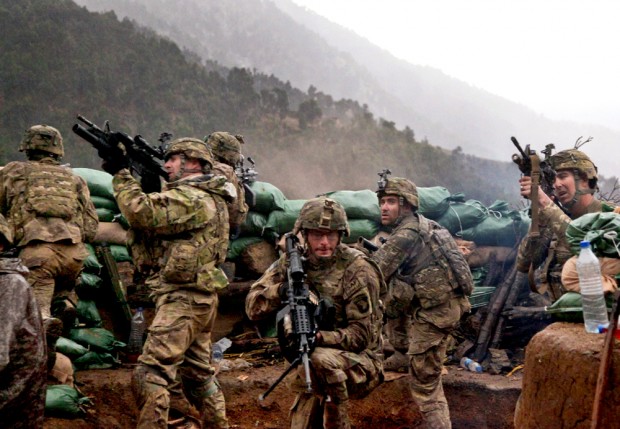As Viktor Bout starts his 25-year jail sentence in the United States, the question on the minds of movie goers worldwide is: will the convicted Russian arms merchant take a visit from Nicolas Cage?
In the 2005 Hollywood movie, Lord of War, the American actor played a Ukrainian-American arms dealer who made his fortune selling leftover Soviet weapons stocks to African warlords.
A prison meeting would be a bonanza for glossy entertainment magazines.
But it is not going to happen.
Why?
Because Bout, locked deep inside the American prison system, is still a player.
Why?
Because Bout, at aged 45, knows far too much for the Kremlin’s comfort.
On April 5, a New York judge imposed a 25-year sentence on Bout, the legal minimum, for conspiring to sell weapons to a US-designated terrorist group, the Revolutionary Armed Forces of Colombia, or FARC.
A journalist friend was in the Manhattan courtroom. Back in Moscow, he tells me Bout “lost it,” verbally attacking the American agent in charge of the case.

U.S. Drug Enforcement Administration agents take Russian arms trafficking suspect Viktor Bout from a chartered plane in New York on Nov. 16, 2010. After a two year extradition battle in Bangkok, Thailand, Bout was flown to U.S. to face terrorism charges: Photo: AP/Drug Enforcement Administration
Within hours, the Kremlin swung into action.
On a visit to Kazakhstan, Foreign Minister Sergei Lavrov denounced Bout’s trial and sentencing. A few days later, in Washington, he brought up Bout in a meeting with U.S. Secretary of State Hillary Clinton.
In Moscow, the Russian Duma’s International Affairs Committee voted unanimously to protest the conviction and vowed public hearings in May.
Russian trade union members and Kremlin support groups picketed the U.S. Embassy in Moscow. Russia’s state-controlled television channels gave generous airtime to a courthouse interview with Bout’s wife, Alla, and to Bout’s post-sentencing video link interview from prison.
“It was not a trial, but an Inquisition-like act,” Bout said from New York’s Metropolitan Correctional Center. “There is no evidence that I traded in weapons.”
Reviewing official Russia’s chorus of complaint, I am tempted to paraphrase Shakespeare’s classic line of suspicion in Hamlet: “Methinks thou dost protest too much.”

Alla Bout, wife of convicted Russian arms dealer Viktor Bout, speaks to Russian TV and radio reporters following the sentencing of her husband in the U.S. Federal Court in New York on April 5, 2012. Bout, caught in an undercover sting by U.S. agents posing as Colombian guerrillas seeking weapons, was sentenced to 25 years in prison by a U.S. judge. Photo: Reuters/Brendan McDermid
On one level, the Kremlin’s multi-level campaign has a target audience of one: Viktor Bout.
It is highly unlikely that Bout acted without official Russian approval in 2008, when he flew to Thailand, met with American agents posing as FARC agents, and offered prices, terms and delivery dates for 100 shoulder held anti-aircraft missiles.
As they might say in a 1930s gangster movie: “Don’t squeal, Bugsy. We’ll spring ya.”
Kremlin’s second target audience is the White House.
Russia’s Foreign Ministry now considers the Bout case “one of the priorities on the Russian-American agenda.” On May 7, Vladimir Putin returns to Russia’s presidency. His return is expected to bring a hyper-pragmatic approach to the West: every Russian “favor” has a price.
Presumably, the Russians are realistic enough to realize that there will be no horse trading over a Bout repatriation to Russia until the American presidential election is decided. Last month, an open microphone caught President Obama telling President Medvedev about missile defense: “After my election, I have more flexibility.”
If a Republican candidate (presumably Mitt Romney) wins in November, resistance may be high to trading Bout. The operation to entrap and arrest Bout in Thailand took place on the watch of the last Republican President, George W. Bush.
While some people in Moscow are debating what the Russians might trade for Bout, the key question is: what is Bout’s value to the Kremlin?

In this courtroom illustration Viktor Bout sits during sentencing in New York on April 5, 2012. At age 45, he faces 25 years in prison. What will the Kremlin offer to get him home? Drawing: Reuters/Jan Rosenberg
For this, I called Doug Farah, a friend and former competitor from our days covering Colombia in the 1990s for rival American newspapers. During our years in Colombia, Farah and I flew over Amazon jungles and Andean mountains in Colombian military aircraft. We know what a game changer it would be if the FARC got their hands on 100 shoulder-held, heat-seeking missiles.
After leaving Colombia, Farah authored with Stephen Braun in 2007 what is considered the definitive Bout book: “The Merchant of Death.”
Speaking from his home in the Washington area, Farah said that during the 1990s and early 2000s, Bout operated on the margins of the Russian power structure.
“If they had caught him in 2003-2004-2005, I doubt the Russian state would have reacted the same way,” Farah said, reviewing the Kremlin’s reaction to Bout’s sentencing. “Then around 2005, Putin imposed control on intelligence services. Bout goes from being an outside operator, from being a freelance operator, to being part of the system.”
In the past, Farah said, Bout would meet with an African warlord, take down his shopping list for Soviet equipment, and then say he would see what he could do. Farah said: “Bout never offered something he could not deliver.”
That changed, he said, by the time Bout met with Hezbollah guerrilla leaders in Lebanon in 2006. That meeting apparently led to the delivery of late Soviet-era anti-tank weapons and rocket propelled grenades. Hezbollah immediately used these weapons in the summer 2006 war with Israel.
The move from selling surplus stocks of AK-47 assault rifles to offering sophisticated late Soviet weaponry, such as shoulder-held anti-aircraft missiles, came because Bout won official protection, says Farah, who is a senior fellow at the International Assessment and Strategy Center in Washington.
“Igor Sechin is his main guy, protecting him as he comes up,” said Farah, referring to a Russian Deputy Prime Minister seen as a right hand man to President-elect Putin.

Deputy Prime Minister Igor Sechin looks on as he attends a Cabinet meeting in Moscow. Sechin and Bout, both Soviet military translators in Portuguese-speaking Africa in the 1980s, say they have never met each other. Photo: AP/ Alexander Zemlianichenko
In his April 12 video link from jail, Bout explicitly denied any ties to the Kremlin.
“Let me say to the ladies and gentlemen who are trying to capitalize on my connections to the Kremlin, to Vladimir Putin or Igor Sechin: you need not pursue this,” Bout said to the Russian press from prison. “Unfortunately, I don’t have any contacts with the Kremlin, or with Putin, or with Sechin.”
Two weeks after Bout’s conviction in New York, Sechin made his first trip ever to the United States, traveling to New York. In the only interview with the American media on the trip, Sechin told The Wall Street Journal that he came to New York to promote American investment in developing Russia’s Arctic oil and gas reserves.
In the 1980s, Sechin worked in Mozambique, where his official Soviet post was Russian-Portuguese interpreter. Bout, believed to be fluent in six languages, was also a Russian-Portuguese military translator, apparently serving in Angola and Mozambique in the late 1980s.
To this day, Mozambique’s national flag is emblazoned with the image of an AK-47, a tribute to the crucial military aid that the Soviet Union gave its independence fighters in the 1970s and its government during a civil war in the 1980s.
Sechin and Bout have said they have never met.

Russian Arms dealer Victor Bout is processed after his arrest in Bangkok, Thailand, on March 8, 2008. Reflecting the value Washington put on Bout, then President George Bush raised the issue of Bout's extradition during a visit with then Prime Minister Samak Sundravei. Photo: AP/David Longstreath
If they were posted at the same time to the same southern African country, that is highly unlikely.
In the 1980s, I made repeated reporting trips to Angola and one to Mozambique. Soviet advisors were clannish and closed, partly because they stood out a mile away against the human landscape of black Africa.
(Toward the end, they opened up to other foreigners. I’ll never forget the evening in February 1989 when a Pravda correspondent gave me a ride in his Lada back to the Hotel Presidente, in Luanda. To my total shock, he volunteered to me his opinion that the Soviet Union was doomed.)
In recent years, Sechin has used his fluency in Spanish to become the Kremlin’s point man on Russia’s arms deals with Venezuelan President Hugo Chavez.
His work bears fruit this year as Venezuela opens a Russia-licensed factory for production of AK-103 assault rifles, an upgraded model of the AK-47.
Regarding the internal violence in neighboring Colombia, Venezuela maintained an official policy of neutrality for the first four decades after the founding of the FARC, in 1964. But in 2002, President Chavez barely survived a coup attempt and the coup leader took refuge in the Colombian embassy in Caracas. After that, President Chavez started to secretly supply the FARC.
Farah said that some of Russia’s arms sales to Venezuela in the 2000s were diverted to Colombian guerrillas. Since Russia and Colombia maintain diplomatic relations, it would be impossible for Russia to openly ship guns directly to Colombia’s anti-government rebels.
“Bout knows a lot about the weapons gray market, about intel issues in Russia,” Farah said about arms trades that the Kremlin does not want to acknowledge. “There is a lot that he could say. And that makes them nervous.”
But then, Bout could also get nervous.
In the Lord of War movie, Nicolas Cage plays an arms dealer named Yuri Orlov.
In real life, a Russian businessman named Oleg Orlov was arrested in 2005 on suspicion of smuggling Soviet-era long-range missiles from Ukraine to Iran. Orlov is often described as an associate of Viktor Bout.
In 2007, the slow moving investigation of Orlov came to an abrupt end. Orlov was found strangled to death in prison in Kyiv.


















































